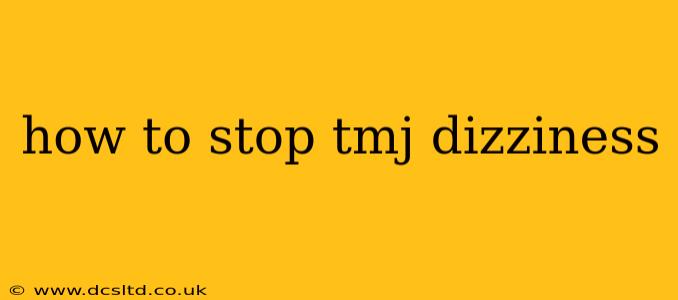Temporomandibular joint (TMJ) disorder can cause a surprising array of symptoms, and dizziness is a common one. The connection between TMJ and dizziness isn't always straightforward, but understanding the potential links can help you manage both effectively. This comprehensive guide explores the relationship between TMJ and dizziness, offering practical strategies for relief.
What is the Connection Between TMJ and Dizziness?
The connection between TMJ and dizziness is complex and not fully understood. However, several theories explain how problems with your jaw joint can lead to feelings of vertigo or lightheadedness:
-
Inner Ear Disturbances: The temporomandibular joint is closely related to the inner ear, which plays a crucial role in balance. Misalignment or dysfunction in the TMJ can potentially affect the inner ear, disrupting balance and leading to dizziness. This could be due to nerve irritation or inflammation affecting structures near the inner ear.
-
Muscle Tension and Blood Flow: Chronic TMJ issues often involve significant muscle tension in the jaw, neck, and shoulders. This tension can restrict blood flow to the brain, potentially causing dizziness, headaches, and other neurological symptoms.
-
Cervical Spine Involvement: Problems in the cervical spine (neck) are frequently linked to TMJ disorders. Neck pain and stiffness, often associated with TMJ, can affect the blood supply to the brain and disrupt the signals responsible for balance, resulting in dizziness.
-
Nerve Compression: The nerves responsible for jaw movement and sensation also travel near the inner ear and other balance-regulating structures. If these nerves are compressed or irritated due to TMJ dysfunction, it could impact balance and cause dizziness.
How to Diagnose TMJ-Related Dizziness?
Diagnosing the root cause of your dizziness is crucial. A healthcare professional, likely an ENT specialist or a dentist specializing in TMJ disorders, should conduct a thorough evaluation. This will involve:
- Physical Examination: This will examine your jaw joint for range of motion, clicking sounds, and tenderness. Your neck and shoulders will also be assessed for muscle tension.
- Imaging Studies: X-rays, CT scans, or MRIs might be necessary to visualize the TMJ and surrounding structures, ruling out any bone abnormalities or other issues.
- Neurological Exam: This might be performed to evaluate your balance, coordination, and reflexes to assess the involvement of the nervous system.
- Detailed History: The healthcare professional will take a comprehensive history, inquiring about the nature, duration, and frequency of your dizziness, as well as your TMJ symptoms.
How Can I Stop TMJ Dizziness?
Treatment for TMJ-related dizziness focuses on managing both the TMJ disorder and the dizziness itself. Strategies may include:
-
Physical Therapy: Exercises designed to improve jaw mobility, reduce muscle tension, and enhance posture can significantly help alleviate both TMJ and dizziness.
-
Medications: Over-the-counter pain relievers (like ibuprofen or naproxen) can help manage pain and inflammation. Your doctor might also prescribe muscle relaxants or other medications to address specific symptoms.
-
Splints or Mouthguards: These devices help reposition the jaw, reducing strain on the joint and alleviating muscle tension. They are particularly helpful for managing nighttime clenching or grinding.
-
Lifestyle Changes: Stress reduction techniques (meditation, yoga), improved posture, and a balanced diet can positively impact both TMJ and dizziness. Avoiding foods that require excessive jaw movement can also be helpful.
-
Alternative Therapies: Some people find relief through alternative therapies like acupuncture, massage therapy, or chiropractic care, although more research is needed in this area.
What are the potential long-term effects of untreated TMJ-related dizziness?
Ignoring TMJ-related dizziness can lead to several long-term consequences:
- Chronic Dizziness: Persistent dizziness can significantly impact your quality of life, making it difficult to perform daily activities.
- Falls and Injuries: Dizziness can increase the risk of falls, resulting in injuries ranging from minor bruises to severe fractures.
- Increased Pain and Muscle Tension: Untreated TMJ will likely worsen over time, causing increased pain and muscle tension, impacting your sleep and overall well-being.
- Headaches: TMJ issues are commonly associated with headaches, and ignoring the dizziness might aggravate headache frequency and intensity.
Does TMJ dizziness always indicate a serious problem?
While TMJ-related dizziness can indicate a serious underlying issue, it's important to remember that many cases are relatively mild and treatable. Prompt diagnosis and treatment are essential to prevent the condition from worsening.
When should I see a doctor about TMJ dizziness?
Seek medical attention if your dizziness is severe, persistent, or accompanied by other concerning symptoms like severe headaches, vision changes, or balance problems. Don't hesitate to consult a doctor or dentist specializing in TMJ disorders if you suspect a connection between your jaw pain and dizziness.
This information is for general knowledge and does not constitute medical advice. Always consult with a qualified healthcare professional for diagnosis and treatment of any medical condition.
